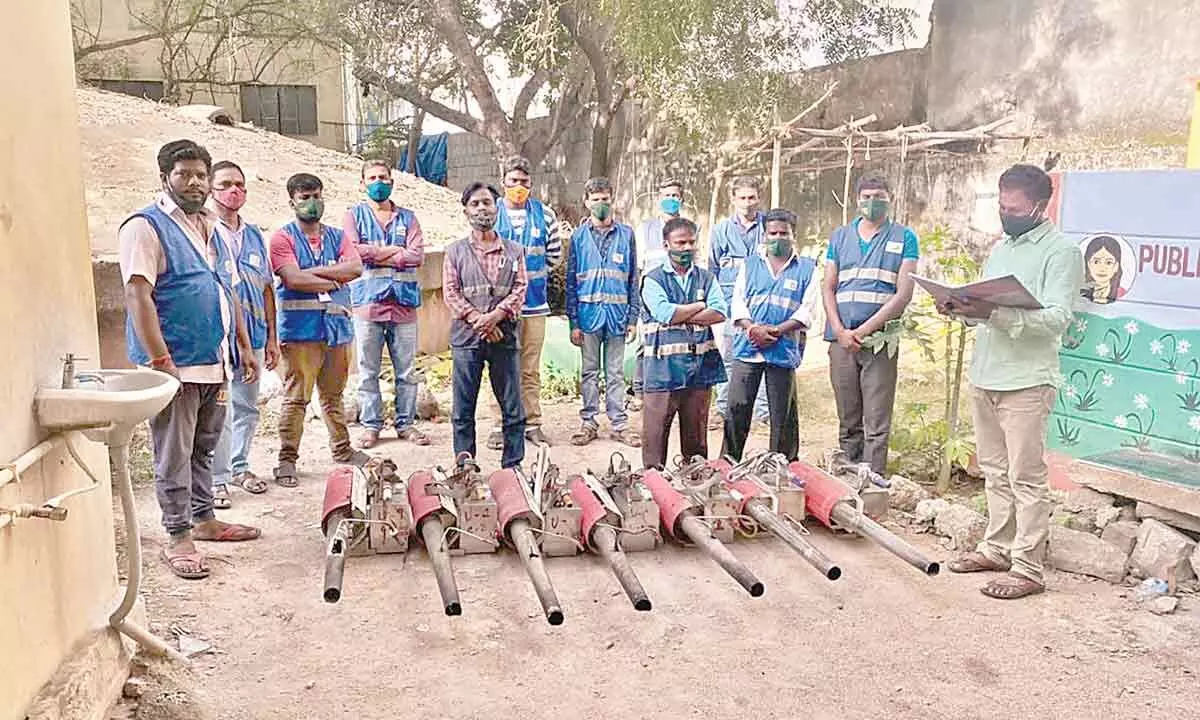Hyderabad: Stung hard by dengue cases, GHMC cranks up special drive

Stung hard by dengue cases, GHMC cranks up special drive
As the dengue cases are on the rise in the city, the Entomology wing of the Greater Hyderabad Municipal Corporation (GHMC) has sounded an alert and doubled the precautionary measures to curb the disease.
Hyderabad: As the dengue cases are on the rise in the city, the Entomology wing of the Greater Hyderabad Municipal Corporation (GHMC) has sounded an alert and doubled the precautionary measures to curb the disease.
As soon as a dengue positive case is registered in any area of the city the GHMC is taking preventive measures immediately to curb the spread of the disease in the locality. As part of this measure, a house-to-house survey is being conducted and samples are being collected and sent to the lab to identify the symptoms.
Dr Rambabu, Chief Entomologist of the GHMC said, "Preventive measures are being taken to prevent the spread of dengue from one person to the other. If there is any dengue positive case found in any house, the surrounding houses are being disinfected. Anti-larva operations are being conducted with 642 teams, 64 mounted fogging machines in each circle and 10 portable fogging machines are carrying out targeted fogging activities every day in each division."
The Entomologist also explained that dengue is a fast-spreading disease that can also infect newborn babies, small children, pregnant women, elderly people and people with weak immune system.
The GHMC has urged citizens to take precautionary measures against the spread of seasonal and infectious diseases especially during the monsoon.
The officials of the GHMC Entomology Department and staff are spreading awareness on the disease so as to prevent mosquito-borne diseases and seasonal diseases from spreading in the city.
Apart from this, to prevent mosquitoes breeding in ponds, preventive medicine is sprayed by drones, fogging measures are carried out using technical methods, fever surveys are carried out from the house to house and measures are being taken to prevent mosquito-borne diseases.
"If there is no cleanliness maintained in and around the house surroundings, there are chances of one getting affected from the diseases like dengue, chicken pox and malaria. Along with vigilance during the monsoon, it is better to take early measures to prevent the spread of diseases," added Dr Rambabu.
Precautionary measures to prevent dengue outbreak
The Aedes mosquito that causes dengue lays many eggs in freshwater. They lay their eggs, especially in tyre, coconut shells, unused rolls, plates at the bottom of flowerpots, plastic cups, broken earthen pots, old fridges, coolers and cement tanks that have water stored for more than a week. The transition from egg stage to mosquito stage takes eight to ten days.
To prevent the the spread of dengue one shall use mosquito nets to prevent mosquito bites, wear full clothes, apply 'odomus' like coatings on the hands in the evening, grow plants like black basil, lemon grass, and Addasaram in the vicinity of the house.
If there is water in the vicinity of the house, kerosene or bandi oil should be applied once a week.
Five types of mosquito that spread dengue in the city
There are 5 types of mosquitoes, each type of mosquito causes different symptoms.
Aedes: Grows in small water reservoirs inside and outside the house and spreads dengue, chicken pox and other diseases.
Anopheles: Grows in good water supply and spreads malaria.
Culex: Grows in sewage storage and spreads encephalitis.
Mansonia: Plants grown in water storage and spread disease.
Armizaris: Septic tanks filled with industrial waste. No matter what kind of diseases are caused by them, the amount of blood they inhale is very high and causes severe discomfort.
Dengue symptoms
High fever, severe headache, pain in the inner part of the eye, vomiting, diarrhea, joint pain, rashes on the skin, bleeding from the gums (only in severe cases) Dengue hemorrhagic (bleeding) fever. Deaths due to the dengue virus are very rare, the GHMC said.

